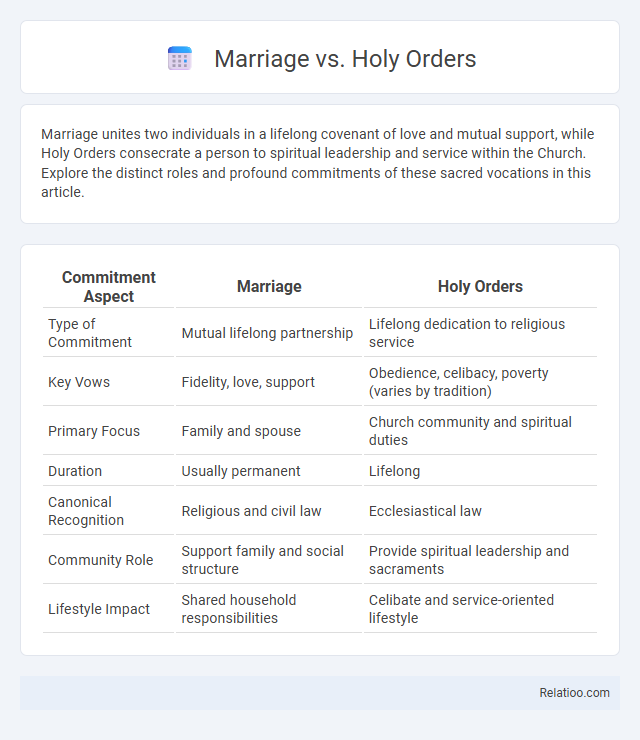Marriage unites two individuals in a lifelong covenant of love and mutual support, while Holy Orders consecrate a person to spiritual leadership and service within the Church. Explore the distinct roles and profound commitments of these sacred vocations in this article.
Table of Comparison
| Commitment Aspect | Marriage | Holy Orders |
|---|---|---|
| Type of Commitment | Mutual lifelong partnership | Lifelong dedication to religious service |
| Key Vows | Fidelity, love, support | Obedience, celibacy, poverty (varies by tradition) |
| Primary Focus | Family and spouse | Church community and spiritual duties |
| Duration | Usually permanent | Lifelong |
| Canonical Recognition | Religious and civil law | Ecclesiastical law |
| Community Role | Support family and social structure | Provide spiritual leadership and sacraments |
| Lifestyle Impact | Shared household responsibilities | Celibate and service-oriented lifestyle |
Understanding the Sacraments: Marriage and Holy Orders
Marriage and Holy Orders are two distinct sacraments within Christian theology, each serving a unique spiritual purpose and mission. Marriage is a sacrament that unites a man and woman in a lifelong covenant, symbolizing the union of Christ and the Church, while Holy Orders confers the grace and authority to perform sacred duties, including priesthood and episcopacy. Both sacraments confer a special grace intended to strengthen the individual's commitment to God and the community, highlighting the Church's role in sanctifying different vocations.
Biblical Foundations of Marriage and Holy Orders
Marriage and Holy Orders are sacraments deeply rooted in biblical teachings, reflecting distinct divine vocations. Marriage is established in Genesis 2:24 as a covenantal union between man and woman, symbolizing Christ's relationship with the Church, as described in Ephesians 5:22-33. Holy Orders, instituted by Christ in passages like John 20:21-23 and Acts 6:1-6, confer spiritual authority for pastoral leadership and sacramental ministry within the Church.
Spiritual Purposes: Union and Mission
Marriage as a sacrament symbolizes the spiritual union between Christ and the Church, fostering a lifelong covenant of love and mutual sanctification that builds family and community. Holy Orders consecrate individuals to a spiritual mission of service, enabling them to act in persona Christi for the spiritual guidance and salvation of the faithful. Both sacraments unite participants to God's divine purpose: Marriage exemplifies the sacred union of love and procreation, while Holy Orders emphasize the mission to shepherd the Church and administer the sacraments.
Roles and Responsibilities in Marriage
Marriage in the Catholic Church is a sacrament that establishes a lifelong covenant between spouses, emphasizing mutual love, fidelity, and openness to procreation. Your primary responsibilities in marriage include nurturing your spouse's spiritual and emotional well-being, fostering family unity, and participating actively in the faith community. Unlike Holy Orders, which entail ordained clergy serving the Church through preaching and administering sacraments, marriage focuses on co-creating a domestic church and supporting each other's path to holiness.
Duties and Callings of Holy Orders
Holy Orders involves a sacred calling to serve the Church through ordained ministry, involving responsibilities such as leading worship, administering sacraments, and offering spiritual guidance. Marriage, as a sacrament, focuses on mutual love, support, and raising a family, requiring spouses to nurture and uphold their covenant. Your understanding of these distinct duties highlights the unique vocation and commitment demanded by Holy Orders compared to the lifelong partnership in Marriage.
Celibacy and Commitment: Key Differences
Marriage, Holy Orders, and Sacrament differ significantly in celibacy and commitment requirements; Marriage involves a lifelong commitment between spouses without celibacy, while Holy Orders require a vow of celibacy and dedication to religious service. The Sacrament of Marriage symbolizes a covenant of mutual love and procreation, contrasting with Holy Orders' sacramental vow prioritizing spiritual duties over marital life. Commitment in Marriage centers on family and partnership, whereas Holy Orders emphasize celibate devotion and service to the Church.
Community Impact: Family vs. Ministry
Marriage fosters strong family units that serve as foundational social structures, promoting stability, emotional support, and intergenerational values within communities. Holy Orders empower clergy to provide spiritual guidance, social services, and leadership, often mobilizing community resources and fostering collective worship and outreach. Each sacrament distinctly shapes community dynamics by nurturing either intimate family bonds or broad ministerial networks that respond to communal needs.
Paths to Holiness: Sacramental Grace Compared
Marriage, Holy Orders, and other sacraments each offer distinct paths to holiness through the reception of sacramental grace, which sanctifies and strengthens Your spiritual journey. Marriage provides grace to live out a lifelong covenant of love and mutual sanctification, while Holy Orders bestow grace for service, leadership, and the administration of other sacraments within the Church. Both vocations contribute uniquely to the Church's mission, emphasizing holiness through commitment and divine empowerment.
Challenges and Blessings of Each Vocation
Marriage presents challenges such as ongoing communication, mutual sacrifice, and balancing family responsibilities, while its blessings include companionship, emotional support, and the creation of a nurturing family environment. Holy Orders face the demands of spiritual leadership, celibacy, and pastoral care, with blessings encompassing deep spiritual fulfillment, communal respect, and lifelong service to faith. The Sacrament as a whole embodies divine grace, inviting believers to embrace their unique vocations, overcome trials, and receive spiritual strength and sanctification.
Discernment: Choosing Between Marriage and Holy Orders
Discernment between Marriage and Holy Orders involves deep spiritual reflection to understand one's call within the Catholic Church's Sacraments of Service and Vocation. Marriage unites a man and woman in a lifelong covenant reflecting Christ's love for the Church, while Holy Orders consecrate individuals to serve as deacons, priests, or bishops, dedicating their lives fully to ministry. This discernment process requires prayer, guidance from spiritual directors, and an honest evaluation of one's gifts and desires to fulfill God's plan most faithfully.

Infographic: Marriage vs Holy Orders
 relatioo.com
relatioo.com